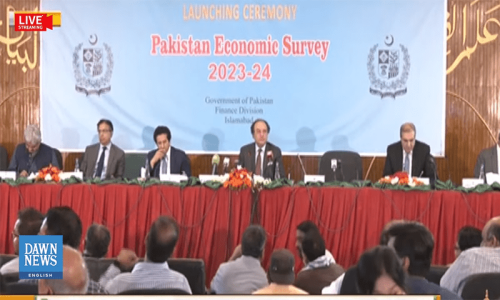Finance Minister Muhammad Aurangzeb presented the Economic Survey of Pakistan 2023-24 on Tuesday. This annual event precedes the budget announcement.
This year’s survey follows the National Economic Council (NEC) approving a substantial increase in the Public Sector Development Programme (PSDP) budget for the next fiscal year.
The survey outlines key socioeconomic outcomes for the current fiscal year, noting that many major targets were not met.
Key Findings
One significant shortfall is the fiscal deficit, estimated to be 20% higher than projected. Similarly, inflation remained high, recorded at around 24.5%, compared to the target of 21%. Despite this, the consumer price index (CPI) showed a sharp decline from January to May, reaching an 11.8% low not seen in 30 months.
This decline in CPI led to a 1.5% reduction in interest rates on Monday, lowering them from 22% to 20.5%. While this reduction does not fully satisfy market expectations, it marks the beginning of a necessary cycle of rate cuts.
Sector Performances
The GDP growth target was missed, primarily due to the industrial sector’s sluggish growth of 1.21%. High borrowing costs and energy tariffs have made business operations expensive, reducing international competitiveness and dampening domestic consumption. High inflation has severely eroded purchasing power for most of the population.
Conversely, the agriculture sector performed strongly, achieving a growth rate of 6.1%. This growth not only boosted exports but also contributed to lowering food prices, helping to moderate the overall inflation rate.
Looking Forward
The Economic Survey of Pakistan 2023-24 highlights the challenges and successes of the past fiscal year, setting the stage for the upcoming budget and future economic strategies.


